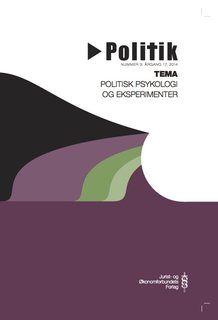Understanding Experimental Economics
DOI:
https://doi.org/10.7146/politik.v17i3.27584Abstract
Experiments have become a well-established methodological tool in economics. e development of experi- mental economics and the diversi cation of experimental methods have equipped economists with new and powerful means of scienti c investigation. eir worth is readily demonstrated in the exciting and promising results they have produced, and will continue to produce. Against the background of this success story, our selective discussion critically highlights four important aspects of experimentation in economics. We concen- trate on the role and importance of material incentives, potentially confounding experimenter demand e ects and strategies to minimise these, the no deception rule as well as the issue of external validity.
Downloads
Published
How to Cite
Issue
Section
License
Forfattere, der publicerer deres værker via dette tidsskrift, accepterer følgende vilkår:
- Forfattere bevarer deres ophavsret og giver tidsskriftet ret til første publicering, samtidigt med at værket er omfattet af en Creative Commons Attribution-licens, der giver andre ret til at dele værket med en anerkendelse af værkets forfatter og første publicering i nærværende tidsskrift.
- Forfattere kan indgå flere separate kontraktlige aftaler om ikke-eksklusiv distribution af tidsskriftets publicerede version af værket (f.eks. sende det til et institutionslager eller udgive det i en bog), med en anerkendelse af værkets første publicering i nærværende tidsskrift.
- Forfattere har ret til og opfordres til at publicere deres værker online (f.eks. i institutionslagre eller på deres websted) forud for og under manuskriptprocessen, da dette kan føre til produktive udvekslinger, samt tidligere og større citater fra publicerede værker (se The Effect of Open Access).

